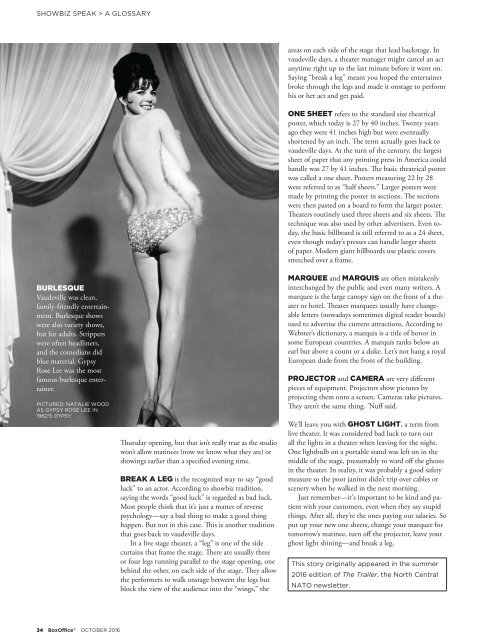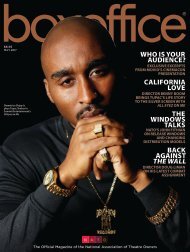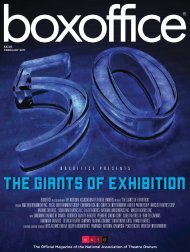Boxoffice - October 2016
The Official Magazine of the National Association of Theatre Owners
The Official Magazine of the National Association of Theatre Owners
Create successful ePaper yourself
Turn your PDF publications into a flip-book with our unique Google optimized e-Paper software.
SHOWBIZ SPEAK > A GLOSSARY<br />
BURLESQUE<br />
Vaudeville was clean,<br />
family-friendly entertainment.<br />
Burlesque shows<br />
were also variety shows,<br />
but for adults. Strippers<br />
were often headliners,<br />
and the comedians did<br />
blue material. Gypsy<br />
Rose Lee was the most<br />
famous burlesque entertainer.<br />
PICTURED: NATALIE WOOD<br />
AS GYPSY ROSE LEE IN<br />
1962'S GYPSY.<br />
Thursday opening, but that isn’t really true as the studio<br />
won’t allow matinees (now we know what they are) or<br />
showings earlier than a specified evening time.<br />
BREAK A LEG is the recognized way to say “good<br />
luck” to an actor. According to showbiz tradition,<br />
saying the words “good luck” is regarded as bad luck.<br />
Most people think that it’s just a matter of reverse<br />
psychology—say a bad thing to make a good thing<br />
happen. But not in this case. This is another tradition<br />
that goes back to vaudeville days.<br />
In a live stage theater, a “leg” is one of the side<br />
curtains that frame the stage. There are usually three<br />
or four legs running parallel to the stage opening, one<br />
behind the other, on each side of the stage. They allow<br />
the performers to walk onstage between the legs but<br />
block the view of the audience into the “wings,” the<br />
areas on each side of the stage that lead backstage. In<br />
vaudeville days, a theater manager might cancel an act<br />
anytime right up to the last minute before it went on.<br />
Saying “break a leg” meant you hoped the entertainer<br />
broke through the legs and made it onstage to perform<br />
his or her act and get paid.<br />
ONE SHEET refers to the standard size theatrical<br />
poster, which today is 27 by 40 inches. Twenty years<br />
ago they were 41 inches high but were eventually<br />
shortened by an inch. The term actually goes back to<br />
vaudeville days. At the turn of the century, the largest<br />
sheet of paper that any printing press in America could<br />
handle was 27 by 41 inches. The basic theatrical poster<br />
was called a one sheet. Posters measuring 22 by 28<br />
were referred to as “half sheets.” Larger posters were<br />
made by printing the poster in sections. The sections<br />
were then pasted on a board to form the larger poster.<br />
Theaters routinely used three sheets and six sheets. The<br />
technique was also used by other advertisers. Even today,<br />
the basic billboard is still referred to as a 24 sheet,<br />
even though today’s presses can handle larger sheets<br />
of paper. Modern giant billboards use plastic covers<br />
stretched over a frame.<br />
MARQUEE and MARQUIS are often mistakenly<br />
interchanged by the public and even many writers. A<br />
marquee is the large canopy sign on the front of a theater<br />
or hotel. Theater marquees usually have changeable<br />
letters (nowadays sometimes digital reader boards)<br />
used to advertise the current attractions. According to<br />
Webster’s dictionary, a marquis is a title of honor in<br />
some European countries. A marquis ranks below an<br />
earl but above a count or a duke. Let’s not hang a royal<br />
European dude from the front of the building.<br />
PROJECTOR and CAMERA are very different<br />
pieces of equipment. Projectors show pictures by<br />
projecting them onto a screen. Cameras take pictures.<br />
They aren’t the same thing. ’Nuff said.<br />
We’ll leave you with GHOST LIGHT, a term from<br />
live theater. It was considered bad luck to turn out<br />
all the lights in a theater when leaving for the night.<br />
One lightbulb on a portable stand was left on in the<br />
middle of the stage, presumably to ward off the ghosts<br />
in the theater. In reality, it was probably a good safety<br />
measure so the poor janitor didn’t trip over cables or<br />
scenery when he walked in the next morning.<br />
Just remember—it's important to be kind and patient<br />
with your customers, even when they say stupid<br />
things. After all, they’re the ones paying our salaries. So<br />
put up your new one sheets, change your marquee for<br />
tomorrow’s matinee, turn off the projector, leave your<br />
ghost light shining—and break a leg.<br />
This story originally appeared in the summer<br />
<strong>2016</strong> edition of The Trailer, the North Central<br />
NATO newsletter.<br />
34 BoxOffice ® OCTOBER <strong>2016</strong>
















